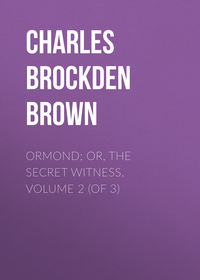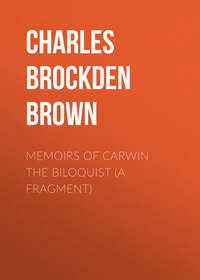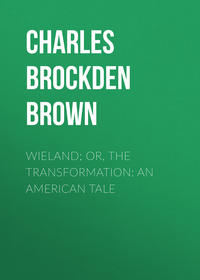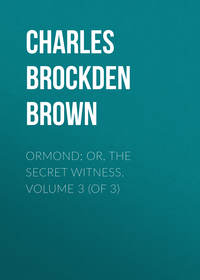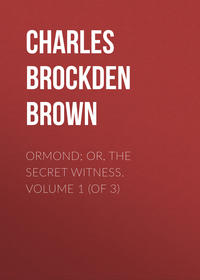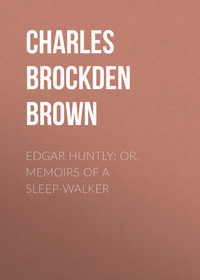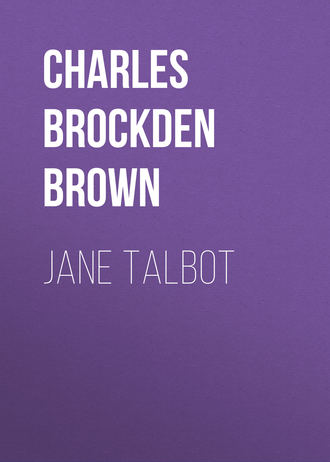 полная версия
полная версияJane Talbot
Pity the weakness of a fond heart, Henry, and let me hear from you, and be your precious and long-withheld letter my relief from every disquiet. I believe, and do not believe, what I have heard, and what I have heard teems with a thousand mischiefs, or is fair and innocent, according to my reigning temper.–Adieu; but let me hear from you immediately.
Letter VIII
To Jane TalbotWilmington, Saturday, October 9.
I thought I had convinced my friend that a letter from me ought not to be expected earlier than Monday. I left her to gratify no fickle humour, nor because my chief pleasure lay anywhere but in her company. She knew of my design to make some stay at this place, and that the business that occasioned my stay would leave me no leisure to write.
Is it possible that my visits to Miss Secker have given you any concern? Why must the source of your anxiety be always so mortifying and opprobrious to me? That the absence of a few days, and the company of another woman, should be thought to change my sentiments, and make me secretly recant those vows which I offered to you, is an imputation on my common sense which–I suppose I deserve. You judge of me from what you know of me. How can you do otherwise? If my past conduct naturally creates such suspicions, who am I to blame but myself? Reformation should precede respect; and how should I gain confidence in my integrity but as the fruit of perseverance in well-doing?
Alas! how much has he lost who has forfeited his own esteem!
As to Miss Secker, your ignorance of her, and, I may add, of yourself, has given her the preference. You think her your superior, no doubt, in every estimable and attractive quality, and therefore suspect her influence on a being so sensual and volatile as poor Hal. Were she really more lovely, the faithless and giddy wretch might possibly forget you; but Miss Secker is a woman whose mind and person are not only inferior to yours, but wholly unfitted to inspire love. If it were possible to smile in my present mood, I think I should indulge one smile at the thought of falling in love with a woman who has scarcely had education enough to enable her to write her name, who has been confined to her bed about eighteen months by a rheumatism contracted by too assiduous application to the wash-tub, and who often boasts that she was born, not above forty-five years ago, in an upper story of the mansion at Mount Vernon.
You do not tell me who it was that betrayed me to you. I suspect, however, it was Miss Jessup. She was passing through this town, in her uncle's carriage, on Wednesday, on her way home. Seeing me come out of the poor woman's lodgings, she stopped the coach, prated for five minutes, and left me with ironical menaces of telling you of my frequent visits to a single lady, of whom it appeared that she had some knowledge. Thus you see that your disquiets have had no foundation but in the sportive malice of your talkative neighbour.
Hannah Secker chanced to be talked of at Mr. Henshaw's as a poor creature, who was sick and destitute, and lay, almost deserted, in a neighbouring hovel. She existed on charity, which was the more scanty and reluctant as she bore but an indifferent character either for honesty or gratitude.
The name, when first mentioned, struck my ear as something that had once been familiar, and, in my solitary evening walk, I stopped at her cottage. The sight of her, though withered by age and disease, called her fully to mind. Three years ago, she lived in the city, and had been very serviceable to me in the way of her calling. I had dismissed her, however, after receiving several proofs that a pair of silk stockings and a muslin cravat offered too mighty a temptation for her virtue. You know I have but little money to spare from my own necessities, and all the service I could render her was to be her petitioner and advocate with some opulent families in this place. But enough–and too much–of Hannah Secker.
Need I say that I have read your narrative, and that I fully acquit you of the guilt laid to your charge? That was done, indeed, before I heard your defence, and I was anxious to hear your story, merely because all that relates to you is in the highest degree interesting to me.
This letter, notwithstanding my engagements, should be longer, if I were not in danger, by writing on, of losing the post. So, dearest love, farewell, and tell me in your next (which I shall expect on Tuesday) that every pain has vanished from your head and from your heart. You may as well delay writing to your mother till I return. I hope it will be permitted me to do so very shortly. Again, my only friend, farewell.
HENRY COLDEN.
Letter IX
To Henry ColdenPhiladelphia, Monday, October 11.
I am ashamed of myself, Henry. What an inconsistent creature am I! I have just placed this dear letter of yours next my heart. The sensation it affords, at this moment, is delicious; almost as much so as I once experienced from a certain somebody's hand placed on the same spot. But that somebody's hand was never (if I recollect aright) so highly honoured as this paper. Have I not told you that your letter is deposited next my heart?
And with all these proofs of the pleasure your letter affords me, could you guess at the cause of those tears which, even now, have not ceased flowing? Your letter has so little tenderness–is so very cold. But let me not be ungrateful for the preference you grant me, merely because it is not so enthusiastic and unlimited as my own.
I suppose, if I had not extorted from you some account of this poor woman, I should never have heard a syllable of your meeting with her. It is surely possible for people to be their own calumniators, to place their own actions in the worst light, to exaggerate their faults and conceal their virtues. If the fictions and artifices of vanity be detestable, the concealment of our good actions is surely not without guilt. The conviction of our guilt is painful to those that love us: wantonly and needlessly to give this pain is very perverse and unjustifiable. If a contrary deportment argue vanity, self-detraction seems to be the offspring of pride.
Thou art the strangest of men, Henry. Thy whole conduct with regard to me has been a tissue of self-upbraidings. You have disclosed not only a thousand misdeeds (as you have thought them) which could not possibly have come to my knowledge by any other means, but have laboured to ascribe even your commendable actions to evil or ambiguous motives. Motives are impenetrable, and a thousand cases have occurred in which every rational observer would have supposed you to be influenced by the best motives, but where, if credit be due to your own representations, your motives were far from being laudable.
Why is my esteem rather heightened than depressed by this deportment? In truth, there is no crime which remorse will not expiate, and no more shining virtue in the whole catalogue than sincerity. Besides, your own account of yourself, with all the exaggerations of humility, proved you, on the whole, and with the allowances necessarily made by every candid person, to be a very excellent man.
Your deportment to me ought chiefly to govern my opinion of you; and have you not been uniformly generous, sincere, and upright?–not quite passionate enough, perhaps; no blind and precipitate enthusiast. Love has not banished discretion, or blindfolded your sagacity; and, as I should forgive a thousand errors on the score of love, I cannot fervently applaud that wisdom which tramples upon love. Thou hast a thousand excellent qualities, Henry; that is certain: yet a little more impetuosity and fervour in thy tenderness would compensate for the want of the whole thousand. There is a frank confession for thee! I am confounded at my own temerity in making it. Will it not injure me in thy esteem? and, of all evils which it is possible for me to suffer, the loss of that esteem would soonest drive me to desperation.
The world has been liberal of its censure, but surely a thorough knowledge of my conduct could not condemn me. When my father and mother united their entreaties to those of Talbot, my heart had never known a preference. The man of their choice was perfectly indifferent to me, but every individual of his sex was regarded with no less indifference. I did not conceal from him the state of my feelings, but was always perfectly ingenuous and explicit. Talbot acted like every man in love. He was eager to secure me on these terms, and fondly trusted to his tenderness and perseverance to gain those affections which I truly acknowledged to be free. He would not leave me for his European voyage till he had extorted a solemn promise.
During his absence I met you. The nature of those throbs, which a glance of your very shadow was sure to produce, even previous to the exchange of a single word between us, was entirely unknown to me. I had no experience to guide me. The effects of that intercourse which I took such pains to procure could not be foreseen. My heart was too pure to admit even such a guest as apprehension, and the only information I possessed respecting you impressed me with the notion that your heart already belonged to another.
I sought nothing but your society and your esteem. If the fetters of my promise to Talbot became irksome after my knowledge of you, I was unconscious of the true cause. This promise never for a moment lost its obligation with me. I deemed myself as much the wife of Talbot as if I had stood with him at the altar.
At the prospect of his return, my melancholy was excruciating, but the cause was unknown to me. I had nothing to wish, with regard to you, but to see you occasionally, to hear your voice, and to be told that you were happy. It never occurred to me that Talbot's return would occasion any difference in this respect. Conscious of nothing but rectitude in my regard for you, always frank and ingenuous in disclosing my feelings, I imagined that Talbot would adopt you as warmly for his friend as I had done.
I must grant that I erred in this particular, but my error sprung from ignorance unavoidable. I judged of others by my own heart, and very sillily imagined that Talbot would continue to be satisfied with that cold and friendly regard for which only my vows made me answerable. Yet my husband's jealousies and discontents were not unreasonable. He loved me with passion; and, if that sentiment can endure to be unrequited, it will never tolerate the preference of another, even if that preference be less than love.
In compliance with my husband's wishes–Ah! my friend! why cannot I say that I did comply with them? what a fatal act is that of plighting hands when the heart is estranged! Never, never let the placable and compassionate spirit be seduced into a union to which the affections are averse. Let it not confide in the afterbirth of love. Such a union is the direst cruelty even to the object who is intended to be benefited.
I have not yet thoroughly forgiven you for deserting me. My heart swells with anguish at the thought of your setting more lightly by my resentment than by that of another; of your willingness to purchase any one's happiness at the cost of mine. You are too wise, too dispassionate, by far. Don't despise me for this accusation, Henry; you know my unbiassed judgment has always been with you. Repeated proofs have convinced me that my dignity and happiness are safer in your keeping than in my own.
You guess right, my friend. Miss Jessup told me of your visits to this poor sick woman. There is something mysterious in the character of this Polly Jessup. She is particularly solicitous about every thing which relates to you. It has occurred to me, since reading your letter, that she is not entirely without design in her prattle. Something more, methinks, than the mere tattling, gossiping, inquisitive propensity in the way in which she introduces you into conversation.
She had not alighted ten minutes before she ran into my apartment, with a face full of intelligence. The truth respecting the washwoman was very artfully disguised, and yet so managed as to allow her to elude the imputation of direct falsehood. She will, no doubt, in this as in former cases, cover up all under the appearance of a good-natured jest; yet, if she be in jest, there is more of malice, I suspect, than of good nature in her merriment.
Make haste back, my dear Hal. I cannot bear to keep my mother in ignorance of our resolutions, and I am utterly at a loss in what manner to communicate them so as to awaken the least reluctance. Oh, what would be wanting to my felicity if my mother could be won over to my side? And is so inestimable a good utterly hopeless? Come, my friend, and dictate such a letter as may subdue those prejudices which, while they continue to exist, will permit me to choose only among deplorable evils.
JANE TALBOT.
Letter X
To Jane TalbotNew York, October 13.
I have just heard something which has made me very uneasy. I am afraid of seeming to you impertinent. You have declared your resolution to persist in conduct which my judgment disapproved. I have argued with you and admonished you, hitherto, in vain, and you have (tacitly indeed) rejected my interference; yet I cannot forbear offering you my counsel once more.
To say truth, it is not so much with a view to change your resolution, that I now write, as to be informed what your resolution is. I have heard what I cannot believe; yet, considering your former conduct, I have misgivings that I cannot subdue. Strangely as you have acted of late, I am willing to think you incapable of what is laid to your charge. In few words, Jane, they tell me that you mean to be actually married to Colden.
You know what I think of that young man. You know my objections to the conduct you thought proper to pursue in relation to Colden in your husband's lifetime. You will judge, then, with what emotions such intelligence was received.
Indiscreet as you have been, there are, I hope, bounds which your education will not permit you to pass. Some regard, I hope, you will have for your own reputation. If your conscience object not to this proceeding, the dread of infamy, at least, will check your career.
You may think that I speak harshly, and that I ought to wait, at least, till I knew your resolution, before I spoke of it in such terms; but, if this report be groundless, my censures cannot affect you. If it be true, they may serve, I hope, to deter you from persisting in your scheme.
What more can I say? You are my nearest relation; not my daughter, it is true; but, since I have not any other kindred, you are more than a daughter to me. That love, which a numerous family or kindred would divide among themselves, is all collected and centred in you. The ties between us have long ceased to be artificial ones, and I feel, in all respects, as if you actually owed your being to me.
You have hitherto consulted my pleasure but little. I have all the rights, in regard to you, of a mother, but these have been hitherto despised or unacknowledged. I once regarded you as the natural successor to my property; and, though your conduct has forfeited these claims, I now tell you (and you know that my word is sacred) that all I have shall be yours, on condition that Colden is dismissed.
More than this I will do. Every assurance possible I will give, that all shall be yours at my death, and all I have I will share with you equally while I live. Only give me your word that, as soon as the transfer is made, Colden shall be thought of and conversed with, either personally or by letter, no more. I want only your promise; on that I will absolutely rely.
Mere lucre ought not, perhaps, to influence you in such a case; and if you comply through regard to my peace or your own reputation, I shall certainly esteem you more highly than if you are determined by the present offer; yet such is my aversion to this alliance, that the hour in which I hear of your consent to the conditions which I now propose to you will be esteemed one of the happiest of my life.
Think of it, my dear Jane, my friend, my child; think of it. Take time to reflect, and let me have a deliberate answer, such as will remove the fears that at present afflict, beyond my power of expression, your
H. FIELDER.
Letter XI
To Mrs. FielderPhiladelphia, October 15.
I have several times taken up the pen, but my distress has compelled me to lay it down again. Heaven is my witness that the happiness of my revered mamma is dearer to me than my own; no struggle was ever greater between my duty to you and the claims of another.
Will you not permit me to explain my conduct? will you not acquaint me with the reasons of your aversion to my friend?–let me call him by that name. Such, indeed, has he been to me,–the friend of my understanding and my virtue. My soul's friend; since, to suffer, without guilt, in this world, entitles us to peace in another, and since to him I owe that I have not been a guilty as well as an unfortunate creature.
Whatever conduct I pursue with regard to him, I must always consider him in this light; at least, till your proofs against him are heard. Let me hear them, I beseech you. Have compassion on the anguish of your poor girl, and reconcile, if possible, my duty to your inclination, by stating what you know to his disadvantage. You must have causes for your enmity, which you hide from me. Indeed, you tell me that you have; you say that if I knew them they would determine me. Let then every motive be set aside through regard to my happiness, and disclose to me this secret.
While I am ignorant of these charges, while all that I know of Colden tends to endear his happiness to me, and while his happiness depends upon my acceptance of his vows, can I, ought I, to reject him?
Place yourself in my situation. You once loved and was once beloved. I am, indeed, your child. I glory in the name which you have had the goodness to bestow upon me. Think and feel for your child, in her present unhappy circumstances; in which she does not balance between happiness and misery,–that alternative, alas! is not permitted,–but is anxious to discover which path has fewest thorns, and in which her duty will allow her to walk.
How greatly do you humble me, and how strongly evince your aversion to Colden, by offering, as the price of his rejection, half your property! How low am I fallen in your esteem, since you think it possible for such a bribe to prevail! and what calamities must this alliance seem to threaten, since the base selfishness of accepting this offer is better, in your eyes, than my marriage!
Sure I never was unhappy till now. Pity me, my mother. Condescend to write to me again, and, by disclosing all your objections to Colden, reconcile, I earnestly entreat you, my duty to your inclination.
JANE TALBOT.
Letter XII
To Mrs. FielderPhiladelphia, October 17.
You will not write to me. Your messenger assures me that you have cast me from your thoughts forever; you will speak to me and see me no more.
That must not be. I am preparing, inclement as the season is, to pay you a visit. Unless you shut your door against me I will see you. You will not turn me out of doors, I hope.
I will see you and compel you to answer me, and to tell me why you will not admit my friend to your good opinion.
J. TALBOT.
Letter XIII
To Jane TalbotNew York, October 19.
You need not come to see me, Jane. I will not see you. Lay me not under the cruel necessity of shutting my door against you, for that must be the consequence of your attempt.
After reading your letter, and seeing full proof of your infatuation, I resolved to throw away my care no longer upon you; to think no more of you; to act just as if you never had existence; whenever it was possible, to shun you; when I met you, by chance, or perforce, to treat you merely as a stranger. I write this letter to acquaint you with my resolution. Your future letters cannot change it, for they shall all be returned to you unopened.
I know you better than to trust to the appearance of half-yielding reluctance which your letter contains. Thus it has always been, and as often as this duteous strain flattered me with hopes of winning you to reason, have I been deceived and disappointed.
I trust to your discernment, your seeming humility, no longer. No child are you of mine. You have, henceforth, no part in my blood; and may I very soon forget that so lost and betrayed a wretch ever belonged to it!
I charge you, write not to me again. H.F.
Letter XIV
To Mrs. FielderPhiladelphia, October 24.
Impossible! Are you not my mother?–more to me than any mother? Did I not receive your protection and instruction in my infancy and my childhood? When left an orphan by my own mother, your bosom was open to receive me. There was the helpless babe cherished, and there was it taught all that virtue which it has since endeavoured to preserve unimpaired in every trial.
You must not cast me off. You must not hate me. You must not call me ungrateful and a wretch. Not to have merited these names is all that enables me to endure your displeasure. As long as that belief consoles me, my heart will not break.
Yet that, even that, will not much avail me. The distress that I now feel, that I have felt ever since the receipt of your letter, cannot be increased.
You forbid me to write to you; but I cannot forbear as long as there is hope of extorting from you the cause of your aversion to my friend. I solicit not this disclosure with a view or even in the hope of repelling your objections. I want, I had almost said, I want to share your antipathies. I want only to be justified in obeying you. When known, they will, perhaps, be found sufficient. I conjure you once more, tell me your objections to this marriage.
As well as I can, I have examined myself. Passion may influence me, but I am unconscious of its influence. I think I act with no exclusive regard to my own pleasure, but as it flows from and is dependent on the happiness of others.
If I am mistaken in my notions of duty, God forbid that I should shut my ears against good counsel. Instead of loathing or shunning it, I am anxious to hear it. I know my own short-sighted folly, my slight experience. I know how apt I am to go astray, how often my own heart deceives me; and hence I always am in search of better knowledge; hence I listen to admonition, not only with docility, but gratitude. My inclination ought, perhaps, to be absolutely neuter; but, if I know myself, it is with reluctance that I withhold my assent from the expostulator. I am delighted to receive conviction from the arguments of those that love me.
In this case, I am prepared to hear and weigh, and be convinced by, any thing you think proper to urge.
I ask not pardon for my faults, nor compassion on my frailty. That I love Colden I will not deny, but I love his worth; his merits, real or imaginary, enrapture my soul. Ideal his virtues may be, but to me they are real, and the moment they cease to be so, that the illusion disappears, I cease to love him, or, at least, I will do all that is in my power to do. I will forbear all intercourse or correspondence with him,–for his as well as my own sake.
Tell me then, my mother, what you know of him. What heinous offence has he committed, that makes him unworthy of my regard?
You have raised, without knowing it perhaps, or designing to effect it in this way, a bar to this detested alliance. While you declare that Colden has been guilty of base actions, it is impossible to grant him my esteem as fully as a husband should claim. Till I know what the actions are which you impute to him, I never will bind myself to him by indissoluble bands.
I have told him this, and he joins with me to entreat you to communicate your charges to me. He believes that you are misled by some misapprehension,–some slander. He is conscious that many of his actions have been, in some respects, ambiguous, capable of being mistaken by careless, or distant, or prejudiced observers. He believes that you have been betrayed into some fatal error in relation to one action of his life.


